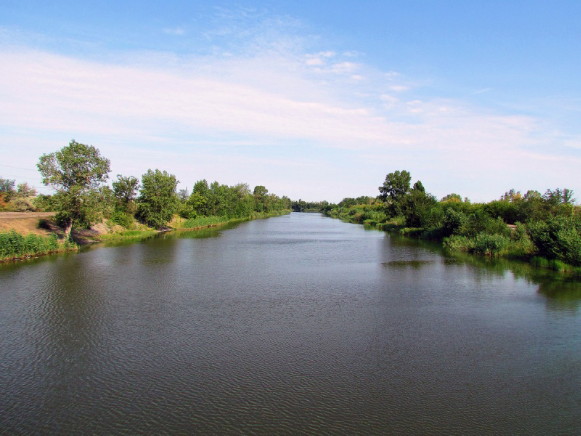Dnipro-Donbas Canal
Dnipro-Donbas Canal [Канал Дніпро-Донбас; Kanal Dnipro-Donbas]. A canal designed to bring water from the Dnipro River to the Donbas and the city of Kharkiv. Construction of the canal began in 1969. It was planned to take place in two stages: the first (completed in 1981) from the Dniprodzerzhynsk Reservoir on the Dnipro along the floodplains of the Orel River to the Krasnopavlivka Reservoir and on to the Donets River near Izium; the second (started in 1976 but suspended in 1996) from the Krasnopavlivka Reservoir to the Karlivka Reservoir west of the city of Donetsk. The first section, which is 263 km long, has a capacity of more than 120 cu m/sec and an annual output of some 3 billion cu m. Water from the Kamianske Reservoir is conveyed by 12 pumping stations, 11 pressure pipelines, 5 aqueducts and 1 tunnel, and is raised 68.3 m on the way to Krasnopavlivka Reservoir. The second section (whose structures are about 50 to 95 percent completed), is 171 km in length, and includes 8 pumping stations, open canals (800 to 2200 m long) and 3 parallel pressure pipes (2 m in diameter); its designed capacity is 25.6 cu m/sec. In addition, a pressure pipeline was built (1976-88) from Krasnopavlivka Reservoir to Kharkiv, by way of Pervomaiskyi and Merefa, to enhance those cities’ water supply. Presently, water from the Dnipro-Donbas Canal also augments the flow of the Donets River above Izium, thus ensuring municipal and industrial water to Donetsk by way of the Donets-Donbas Canal. In addition to municipal and industrial water supply, the Dnipro-Donbas Canal provides water for irrigation. In 1979 it provided for the irrigation of 165,000 ha of agricultural land in its vicinity.
Ihor Stebelsky
[This article originally appeared in the Encyclopedia of Ukraine, vol. 1 (1984).]
